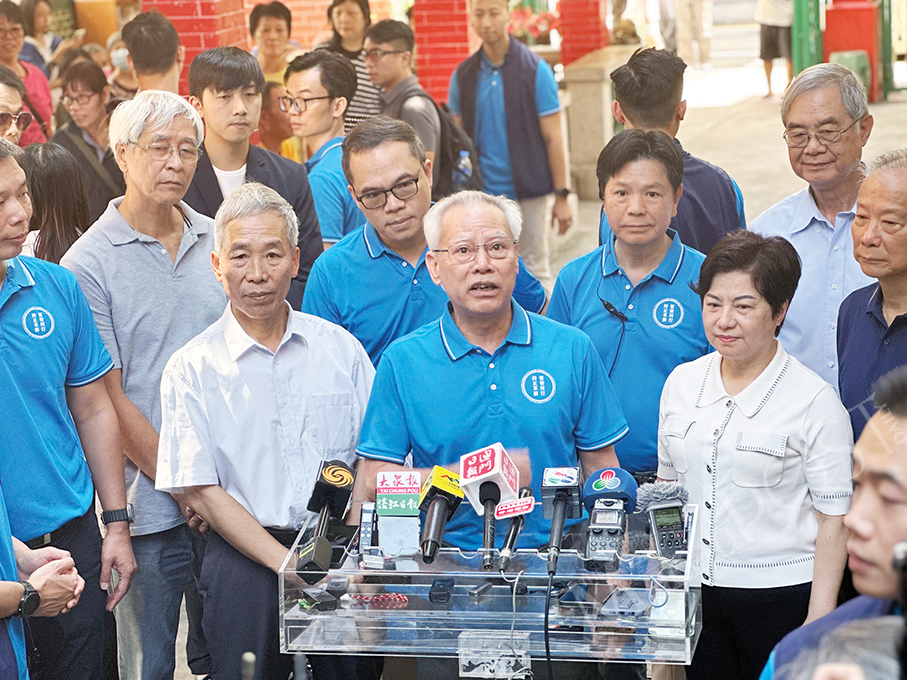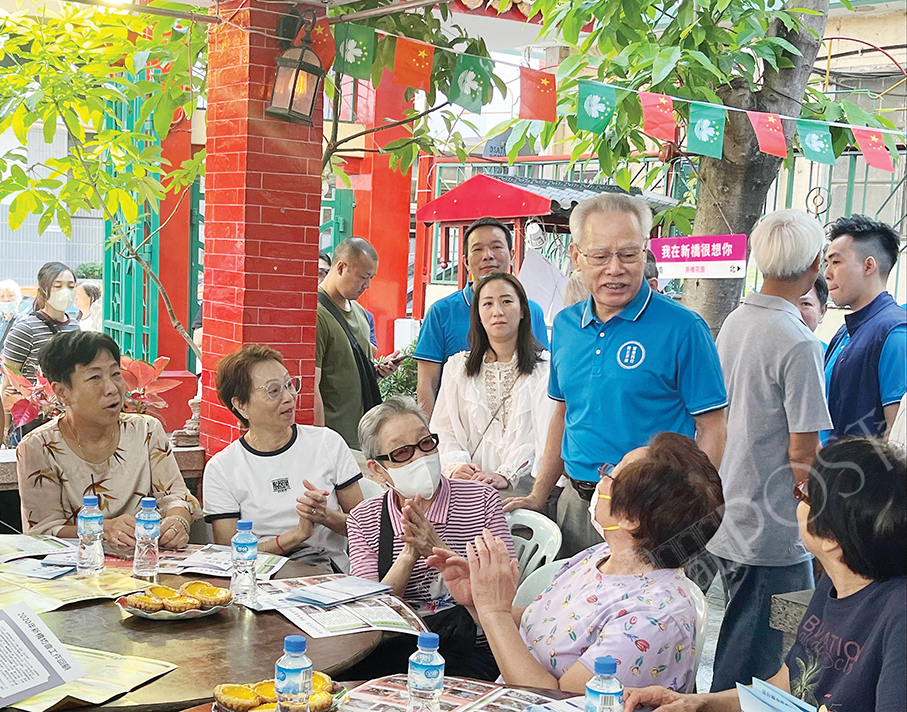Macau’s sole candidate for the sixth-term chief executive Sam Hou Fai has been visiting various neighbourhoods to listen to people’s views, aiming to gauge public sentiment, and after yesterday’s walkabout in San Kio district, he said that the government should consider introducing support measures through online and offline marketing campaigns to improve different neighbourhoods’ business situation.
The chief executive election will be held on October 13. Accompanied by Women’s General Association of Macau Vice-Chairwoman Lau Kam Ling, Macau Federation of Trade Unions (MFTU) Vice President Fong Ka Fai, Industry and Commerce Associations of Macau Central and Southern District President Lei Cheok Kuan and Macau General Union of Neighbourhood Associations Vice President Chan Hio Peng, Sam, the former president of the Court of Final Appeal (TUI), exchanged views with residents and shop owners in the areas of Rotunda de Carlos da Maia (colloquially known as “Three Lamps” – 三盞燈) and Rua da Emenda (義字街), including shops selling knitted fabrics, ginseng and dried seafood, bedding sets and bed linen, glasses and flowers, to learn more about their business conditions.
“Business operators are indeed [expressing the view that their turnover has been affected by the Northbound Travel for Macau Vehicles scheme], which cannot be avoided due to the ongoing integration between the two places [Macau and the mainland]. However, at the same time, I also saw that many of the business operators still have the spirit of perseverance, and some of them will adjust their [business operations], while others will just carry on,” Sam told reporters after yesterday morning’s about two-hour walkabout, adding he believed that it was just a phased impact: “Yesterday [Wednesday], 167,000 visitors came from the mainland……This trend is slowly complementing each other” (Macau residents visiting the mainland and mainlanders visiting Macau).
The Northbound Travel for Macau Vehicles scheme, which was launched by the local and mainland governments at the beginning of this year, allows Macau residents to drive their cars, in Guangdong Province, i.e., north of Macau.
Sam went on to say that the impact of the Northbound Travel for Macau Vehicles scheme on business operators in the San Kio district was far less severe than that of the businesses in the northern district (北區) thanks to its good neighbourhood atmosphere, deep cultural background, the spirit of mutual assistance among neighbours: “As long as they are confident that they can continue their business, the government should definitely consider this aspect, examine what support measures are available, understand the situation, and see how their business environment can be improved to attract mainland visitors, especially the younger generation, to these culture-orientated communities of ours”.
Sam mentioned his personal affection for the district: “I’m very attached to this neighbourhood, I had lived in three different places in the San Kio area since 1986 until I became the president of the Court of Final Appeal and moved elsewhere”.
Sam pointed out that San Kio (“New Bridge”) district is the most historically and culturally rich neighbourhood in Macau and, at the same time, it is a typical Burmese-Chinese community with about 46,000 residents and several primary schools. He added that with well-organised social services in the district and its deep cultural background, Macau should think about how to attract tourists to the district, especially young people from the nation, and even those from Southeast Asia, so as to “organically combine this kind of harmonious old community of Macau with the mainstream Chinese cultural traditions, and to form an immersive experience.”
Meanwhile, after his community visit to Iao Hon (“Blessing the Han”) district on Wednesday, Sam told the media he hoped that a consensus could be reached through dialogue with all sectors of the community, so that redevelopment could “make a real start and deal with it in a down-to-earth manner”, in order to improve the living environment of the residents. He also pointed out on Wednesday that he chose the densely populated Iao Hon district as the first stop on his community visits as he hoped to lay a foundation for his future governance and planning by understanding each community’s environment and the operation of small- and medium-sized enterprises (SMEs).
In view of the fact that there’s insufficient open space in Iao Hon with only three small sitting-out areas, which was far less favourable than such facilities in Taipa, Sam said that the provision of open space and sports facilities there should be enhanced in the future and consideration should be given to making use of open space to increase the number of related facilities to meet the needs of residents, including students, in the northern district.
On the public transport and traffic front in the two districts, Sam pointed out, both yesterday and on the previous day, the need for overall planning by the government, from transport to the living environment. He also underlined that both districts include major but narrow roads that are often congested during the peak commuting hours, combined with a lack of carparks and parking spaces for motorcycles.

Macau’s sixth-term chief executive candidate Sam Hou Fai speaks to reporters yesterday after his visit to San Kio district. – Photo: Yuki Lei

Sam Hou Fai talks to residents in the San Kio neighbourhood during yesterday’s walkabout. – Photo: Maria Cheang Ut Meng







